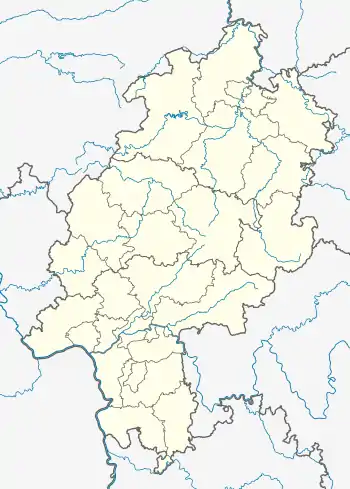Hungen
Hungen is a town in the district of Gießen, in Hesse, Germany. It is situated 20 km southeast of Gießen, and 18 km northeast of Friedberg. Surrounding towns are Laubach to the north, Nidda to the east, Wölfersheim to the south, and Münzenberg and Lich to the west.
Hungen | |
|---|---|
 Coat of arms | |
Location of Hungen within Gießen district  | |
 Hungen  Hungen | |
| Coordinates: 50°28′N 08°54′E | |
| Country | Germany |
| State | Hesse |
| Admin. region | Gießen |
| District | Gießen |
| Government | |
| • Mayor | Klaus Peter Weber |
| Area | |
| • Total | 86.75 km2 (33.49 sq mi) |
| Elevation | 144 m (472 ft) |
| Population (2019-12-31)[1] | |
| • Total | 12,596 |
| • Density | 150/km2 (380/sq mi) |
| Time zone | UTC+01:00 (CET) |
| • Summer (DST) | UTC+02:00 (CEST) |
| Postal codes | 35410 |
| Dialling codes | 06402 |
| Vehicle registration | GI |
| Website | www.hungen.de |
The history of Hungen dates back to 782. In 1806 it came under the sovereignty of the Grand Duchy of Hesse.
Buildings of interest include the Hungen Castle, the Evangelical Church, parts of the medieval city wall and Hungen station.
Looted books depository
At the end of World War II American forces discovered almost 1.2 million looted books and prints at Hungen, among them the contents of the Rothschild Library at Frankfurt, which had been removed by the Nazis from Frankfurt because of Allied bombing raids.[2][3]
Hungen in the media
Literature
Shmuel Spector, Geoffrey Wigoder, The Encyclopedia of Jewish Life Before and During the Holocaust ISBN 0-8147-9356-8, New York University Press, 2001.
Film
My Opposition: the Diaries of Friedrich Kellner
- The railroad station of Hungen can be seen in this 2007 Canadian documentary, which recounts the story of Robert Scott Kellner and his grandfather, Friedrich Kellner, chief justice inspector of Laubach who wrote the anti-Nazi diary, "My Opposition."
See also
- Hungen (meteorite), for the Hungen meteorite (fallen in 1877).
References
- "Bevölkerungsstand am 31.12.2019". Hessisches Statistisches Landesamt (in German). July 2020.
- Michael Frank. "The Mystery of the Missing Jewish Books of Rome". Tablet. Retrieved 3 October 2018.
- Activity Report on the activities of the commission for the recovery of the bibliographic patrimony of the Jewish community in Rome stolen in 1943 (PDF) (Report). Government of Italy - Presidency of the Council of Ministers. Retrieved 3 October 2018.